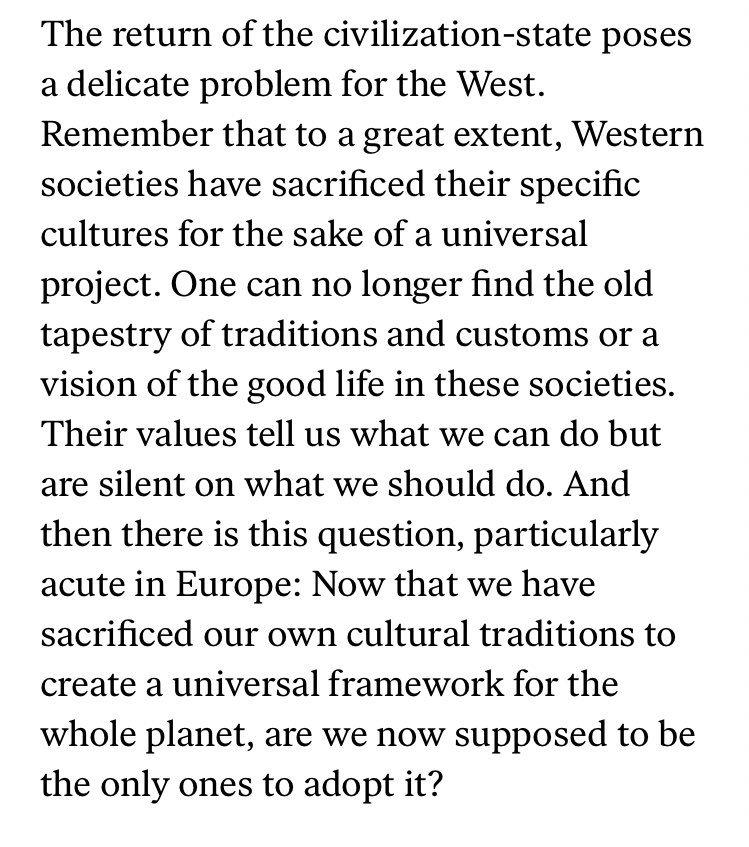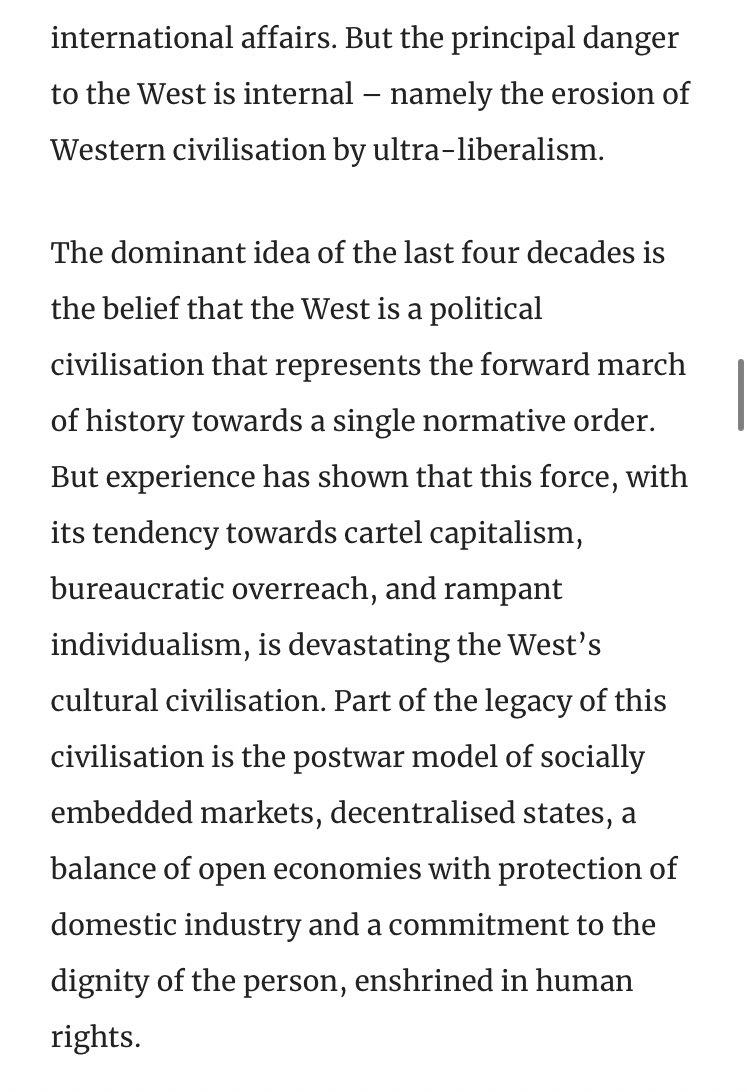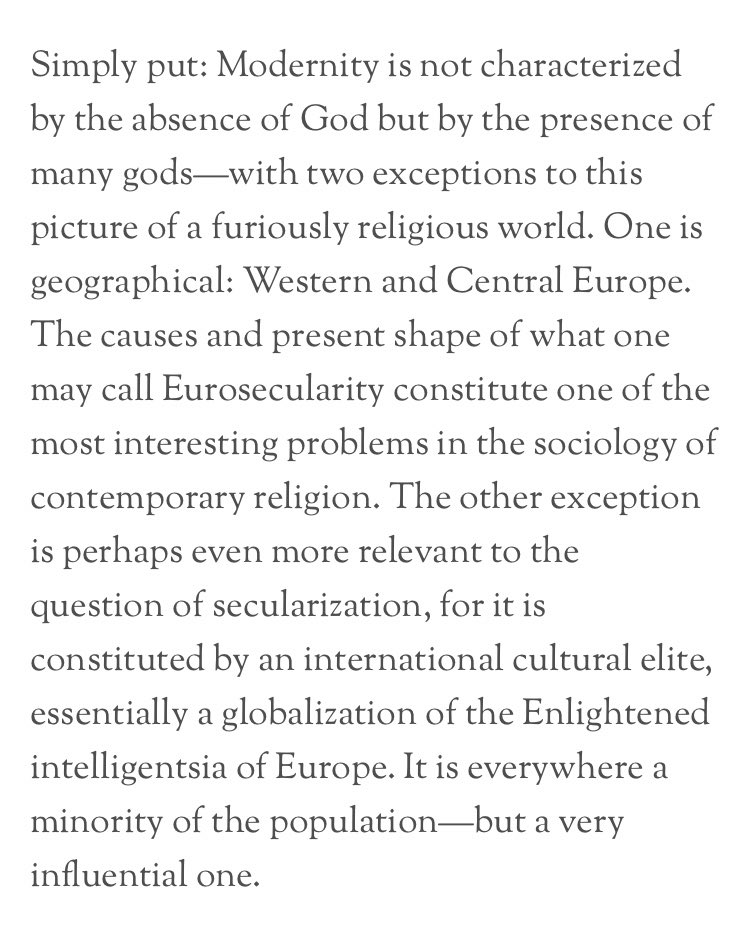The Cold War inheritance of the West, in the hard neoliberal Thatcher-Reagan fusionist settlement, has not been entirely successful.
While it made necessary repair on economic tribulations, it has failed by other vital metrics...
While it made necessary repair on economic tribulations, it has failed by other vital metrics...
First/ Traditions were not protected.
As scholars Bruno Maçães and Adrian Pabst note, the greatest cultural erosion to any sense of a unifying, rooted Western civilisation has been at the hands of a universalising ‘ultra-liberalism’.
As scholars Bruno Maçães and Adrian Pabst note, the greatest cultural erosion to any sense of a unifying, rooted Western civilisation has been at the hands of a universalising ‘ultra-liberalism’.
While both leaders, and indeed both the Republican and Conservative parties purported to still subscribe to social conservatism (hence, the fusion), what was achieved were dramatic policy reforms to support economic liberalism and little more than lip service paid to the former.
Many, such as sociologist Peter L. Berger, have underlined how socially liberal and secular sentiment are overwhelmingly supported and promoted by a minority of small, wealthy elites.
The multinational corporate world is no exception; fusionist ideology provides no defence.
The multinational corporate world is no exception; fusionist ideology provides no defence.
Second/ Regions were harrowed and homes were turned to deprivation.
Especially true of the UK, but also elsewhere such as America’s so-called ‘rust belt’, economic liberalism has been responsible for seeing industry flee regions for more affluent and global international hubs.
Especially true of the UK, but also elsewhere such as America’s so-called ‘rust belt’, economic liberalism has been responsible for seeing industry flee regions for more affluent and global international hubs.
A case in point is Detroit; in 1950 the wealthiest city in America, it later became easily one of the poorest cities in the country.
This was thanks the deindustrialisation and global outsourcing of its formerly thriving automobile industry. https://www.michigancapitolconfidential.com/12832
This was thanks the deindustrialisation and global outsourcing of its formerly thriving automobile industry. https://www.michigancapitolconfidential.com/12832
Yet, crucially, what is important here is not just to focus on the economic statistics, but also the social consequences.
The city, which had a population of above two million, was depopulated to merely seven hundred thousand in 2015.
The city, which had a population of above two million, was depopulated to merely seven hundred thousand in 2015.
For those who either did not want to leave their home, or were perhaps too poor to consider doing so, the remaining city was blighted by poverty, crime, and early death.
This is important as it is reminiscent to the attitude of neoliberals towards the integral communities within a nation; which is one of entirely cold indifference.
The argument of the fusionists that protecting loss-making industries was unsustainable was accurate and...
The argument of the fusionists that protecting loss-making industries was unsustainable was accurate and...
... reasonable, but what was not sufficiently justified was the absolute lack of effort to support the economic lifeblood of the communities they had prior allowed to be devastated.
Yet Detroit serves only as a metaphor for what has taken place across both the UK and US.
Yet Detroit serves only as a metaphor for what has taken place across both the UK and US.
Indeed, for the youth who would aspire to financial independence growing up in such deprived regions, remaining in their homes- where they could continue to be rooted in both in their local communities and with their families- became untenable.
Increasingly, the youth have abandoned their homes to pursue jobs only found in national and regional capitals, allowing a continued and ongoing depopulation that we see today.
Thereby, we also observe a phenomenon akin to an unnecessary intra-state ‘brain drain’.
Thereby, we also observe a phenomenon akin to an unnecessary intra-state ‘brain drain’.
The indifferent attitude from the neoliberal fusionists which entails a general position of “if it is so negative for you to live in the regions- move, else remain and suffer the consequences, but expect no political help” is neither morally nor practically adequate.
An alternative must be found which does not merely leave historical regions of nations, outside the global economic urban hubs, to be left exposed to corroding winds of a vulturous globalisation.
Conservatives must make remaining in, or close to, one’s home economically viable.
Conservatives must make remaining in, or close to, one’s home economically viable.
Third/ The family as an institution collapsed.
Philosophers Aristotle and G. W. F. Hegel noted the paramount social importance of this foundational unit to a polis, state, or nation.
Yet in today’s society, family breakdown is exceedingly common.
Philosophers Aristotle and G. W. F. Hegel noted the paramount social importance of this foundational unit to a polis, state, or nation.
Yet in today’s society, family breakdown is exceedingly common.
The government response to the substantial psychological, financial, and educational implications this has on children has been merely reactive, never preventative.
As record numbers are growing up without their fathers or in struggling single-parent homes, this needs to change.
As record numbers are growing up without their fathers or in struggling single-parent homes, this needs to change.
This is not to criticise devoted single parents, but to point out that having both parents is optimal to a child’s psychosocial development, and few single parents would refute the notion a loving, compatible, financially assisting partner would be to their benefit.
In 2018, the BBC reported that over 33% of children in single parent homes were growing up in poverty, and the figure is set to rise sharply to 61% by 2021.
This forecast was before the economic implications of a global pandemic. https://www.google.co.uk/amp/s/www.bbc.co.uk/news/amp/uk-43140285
This forecast was before the economic implications of a global pandemic. https://www.google.co.uk/amp/s/www.bbc.co.uk/news/amp/uk-43140285
Indeed, fewer people are getting married in the modernity of the West, and family breakdown is soaring.
In 2012, the BBC also reported that “The UK has one of the highest rates... in the Western world, with just 68.9% of children living with both parents”. https://www.bbc.co.uk/news/uk-20863917
In 2012, the BBC also reported that “The UK has one of the highest rates... in the Western world, with just 68.9% of children living with both parents”. https://www.bbc.co.uk/news/uk-20863917
Hegel noted that it is primarily in the family where we develop our consciousness of society at large. Herein, an understanding is attained; of the relations between obligations and liberty, of order, of authority, of love and belonging.
Its demise explains much of our turmoil.
Its demise explains much of our turmoil.
The fusionists, and their contemporary centre-right inheritors, again were entirely ambivalent to this catastrophic societal development.
Quiet murmurs were made, such as in part of David Cameron’s ‘Big Society’, but this had little consequence on policy. https://www.gov.uk/government/speeches/david-cameron-on-families
Quiet murmurs were made, such as in part of David Cameron’s ‘Big Society’, but this had little consequence on policy. https://www.gov.uk/government/speeches/david-cameron-on-families
Four/ Conclusions and alternatives.
While the fusionists echoed more the thinking of Friedrich Hayek than Robert Nozick, their general stance on the ideal role of government was still much closer to the ‘night-watchman state’ than to any paternalist, truly conservative one.
While the fusionists echoed more the thinking of Friedrich Hayek than Robert Nozick, their general stance on the ideal role of government was still much closer to the ‘night-watchman state’ than to any paternalist, truly conservative one.
This incoherence was a result of a philosophical blasphemy; a fusion between ways of thinking that are fundamentally opposed and had been mortal foes for much of democratic political history.
Fundamentally, liberalism and traditionalist conservatism do not mix well.
Fundamentally, liberalism and traditionalist conservatism do not mix well.
As they contradict each other (liberalism promotes an indifference to human ends, while conservatism affirms the traditional way of life as a desirable good), preference will always be given to one over the other.
As Roger Scruton puts it; to be a conservative is to hold certain things to be sacred, needing of protection...
As globalising market forces compromise the family, communities, and lead governments to see the maximisation of the national economy as more desirable that providing working parents the dignity of work, conservatives ought to re-examine what is most sacred to them.
Scruton was an enigma.
A fantastic mind and brilliant articulator, he was still in part quite unusually wedded to this fusion.
Conservatives are not, and never ought to be, contractualists. It is a liberal individualist doctrine- not conservative, communitarian or Christian.
A fantastic mind and brilliant articulator, he was still in part quite unusually wedded to this fusion.
Conservatives are not, and never ought to be, contractualists. It is a liberal individualist doctrine- not conservative, communitarian or Christian.
We seek to preserve these sacred assets not because of their mere utility, or what they give back, but precisely because they are sacred.
Their sanctity is inherent in them.
We believe in loyalty and devotion, not trade-offs.
Their sanctity is inherent in them.
We believe in loyalty and devotion, not trade-offs.
Thus, the conservatism which would seek to salvage enormously imperiled Western societies must move past these insufficient and destructive philosophical attitudes to politics.
This is why we echo great minds; @Phillip_Blond, @Vermeullarmine, @PatrickDeneen, and @SohrabAhmari, to name but a few, in stating that conservatives of the 21st century must recognise the dangers posed by liberal doctrines on the right.
They must be post-fusionist.
/Fin
They must be post-fusionist.
/Fin

 Read on Twitter
Read on Twitter






